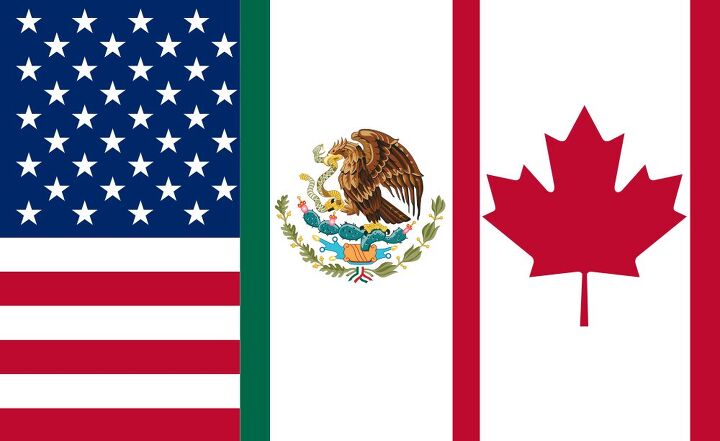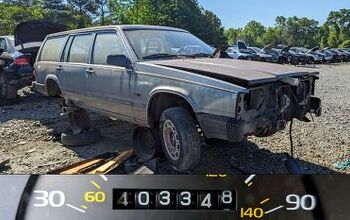Looks Like NAFTA Renegotiations Aren't Happening This Year

Governance is one hell of a slippery fish. While you want your elected officials to assist in helping the nation evolve with an ever-changing society, you don’t want a deluge of contradictory and ill-planned laws mucking things up. That’s why the best progress is carefully measured and negotiated. But something has to happen eventually or you begin wondering what we (and the various lobbies) are paying these dingbats the big bucks for.
For example, the North American Free Trade Agreement looks like it’s about to be abandoned until sometime after 2019. After negotiations missed numerous self-imposed deadlines, U.S. House Speaker Paul Ryan said Congress needed a notice of intent to sign by roughly May 17th if anything was to be finalized for 2018. That date came and went. Now, everyone appears to have thrown their hands up, with practically every country on the planet currently considering retaliatory tariffs against the United States.
U.S. President Donald Trump’s new import fees on steel and aluminum haven’t gone over particularly well. Automakers are considering making changes to cope, as well as preparing themselves for the possibility of new automotive tariffs — which are also threatened. The president’s trade decisions appear to have slammed the door squarely on the head of nations hoping to renegotiate NAFTA before the sun burns out.
Last week, Canadian Prime Minister Justin Trudeau began expressing frustrations with the U.S. “Let me be clear: These tariffs are totally unacceptable,” Trudeau said at a press conference on Thursday.
Trudeau followed up a few days later by suggesting Trump’s claim that the United States’ new tariffs are being considered because of national security concerns was an affront to the two countries’ longstanding relationship. “The idea that, you know, our soldiers who had fought and died together on the beaches of World War II and the mountains of Afghanistan, and have stood shoulder to shoulder in some of the most difficult places in the world, that are always there for each other, somehow — this is insulting to that,” he explained to NBC.
Canada, which is the largest exporter of steel to the U.S., has already announced retaliatory tariffs. Officials are practically begging for revenge at this point, which is a common theme in Europe, too. Trudeau, however, was careful to mention he was upset with the U.S. leadership and not its citizenry.
Meanwhile, Mexico is gearing up for next month’s presidential election — which could bring big changes. As Enrique Pena Nieto is not eligible for reelection, there will be someone new at the helm when NAFTA negotiations resume in earnest. Leftist politician Andres Manuel Lopez Obrador is the current frontrunner and his placement, as well as the probable shakeup in the Mexican Senate, could severely alter the tone of future trade talks.
Of course, the United States is having its own elections this November — and that’s the main reason the country has essentially given up taking NAFTA seriously until 2019. It’s campaigning season. However, even if none of the above issues were present, there is no guarantee that trade negotiations would have enjoyed smoother sailing.
Numerous proposals from the United States have proven a non-starter with Mexico and Canada. Automotive content requirement rules, now scaled back to appease partner countries, have been a constant sore spot and Mexico refuses to entertain some of the more ambitious employment regulations suggested by the North. Trade talks were never progressing in a way anyone would describe as favorably.
As if that wasn’t bad enough, Trump recently mentioned it might be better to simply end three-way talks on NAFTA and deal with Canada and Mexico individually. “He is very seriously contemplating kind of a shift in the NAFTA negotiations. His preference now, and he asked me to convey this, is to actually negotiate with Mexico and Canada separately,” Larry Kudlow, the White House’s chief economic adviser, said on Fox News Tuesday morning. “He prefers bilateral negotiations and he’s looking at two, much different countries.”
According to The New York Times, numerous senators have come out to urge the president to stay the course with NAFTA and find one universal agreement all countries can live with. It also referenced survey of chief executive officers, released Tuesday morning by Business Roundtable, that showed the majority are fearful of administration’s current trade policy. The very real prospect of economic revenge from other countries as trade tensions escalate pose a substantial risk to their businesses — and among those with the most to lose is the automotive industry.
[Image: NAFTA Secretariat]

A staunch consumer advocate tracking industry trends and regulation. Before joining TTAC, Matt spent a decade working for marketing and research firms based in NYC. Clients included several of the world’s largest automakers, global tire brands, and aftermarket part suppliers. Dissatisfied with the corporate world and resentful of having to wear suits everyday, he pivoted to writing about cars. Since then, that man has become an ardent supporter of the right-to-repair movement, been interviewed on the auto industry by national radio broadcasts, driven more rental cars than anyone ever should, participated in amateur rallying events, and received the requisite minimum training as sanctioned by the SCCA. Handy with a wrench, Matt grew up surrounded by Detroit auto workers and managed to get a pizza delivery job before he was legally eligible. He later found himself driving box trucks through Manhattan, guaranteeing future sympathy for actual truckers. He continues to conduct research pertaining to the automotive sector as an independent contractor and has since moved back to his native Michigan, closer to where the cars are born. A contrarian, Matt claims to prefer understeer — stating that front and all-wheel drive vehicles cater best to his driving style.
More by Matt Posky
Latest Car Reviews
Read moreLatest Product Reviews
Read moreRecent Comments
- Zerofoo No, I won't miss this Chevrolet Malibu. It's a completely forgettable car. Who in their right mind would choose this over a V8 powered charger at the rental counter? Even the V6 charger is a far better drive.
- Offbeat Oddity Nope, I won't miss it. I loved the 2008-2012 Malibu, but the subsequent generations couldn't hold a candle to it. I think the Impala was much more compelling at the end.
- Zerofoo An almost 5000 pound hot hatch that fell out of the ugly tree and hit every branch on the way down? No thanks.
- Tassos Jong-iL This would still be a very nice car in North Korea.
- Jeff One less option will be available for an affordable midsize sedan. Not much can be done about GM discontinuing the Malibu. GM, Ford, and Stellantis have been discontinuing cars for the most part to focus on pickups, crossovers, and suvs. Many buyers that don't want trucks or truck like vehicles have moved onto Japanese and South Korean brands. Meanwhile large pickups and suvs continue to pile up on dealer lots with some dealers still adding market adjustments to the stickers. Even Toyota dealers have growing inventories of Tundras and Tacomas.


































Comments
Join the conversation
Two books from the early/mid 90s deserve to be revisited at the moment: "The End of History" by Francis Fukuyama, and "The Clash of Civlizations" by Samuel Huntington. Both books, in retrospect, did a good job of painting the world that we live in today. The Western alliances, political, economic and military, were all formed after WWII in an effort to blunt the Soviets. America wrote trade agreements that were overly generous to its partners to ensure that they were pulled into our orbit. Post WWII, Europe and Japan needed to rebuild, America had capital and manufacturing capacity, and there was a common enemy. Post 1991, absent the Soviets, this system became less relevant by the year. It has essentially taken 25 years for that socio-economic system to devolve. What's taken its place is Huntington's Clash of Civilizations - where tribalism has replaced nationalism, and people have retreated into socio-cultural groups (contrary to what many academics thought would happen). In short, as the world became smaller via technology, people have actually turned inward. I am, of course, over-simplifying. But now that there is no common enemy, and the US populace has finally begun to realize that no, not everyone needs to go to college. and that basic manufacturing / blue collar jobs are actually crucial to a well balanced society, and that financialization has wrecked both our buying power and well being. Trump knows that he holds a lot of cards: while the Chinese may be the largest market in terms of quantity, the US market is far more robust, trustworthy and above all - far better regulated (those are relative terms, I grant you). The question is if Trump will successfully accomplish a 'rebalancing' of trade through his type of brinksmanship. Of course it's risky, but so would continuing down the same path we have been for the past 40 years. I've said before that I find Trump distasteful, but the Cold War paradigm is (finally) past - and we're in this awkward middle phase. It's dangerous because a lot of forces have been unleashed and are now competing out in the open. It's messy, it's foggy, and nobody knows where or how things will play out. But the rules by which we played for 60 years have been broken.
@BigAlFromOzYou are not including Obama in your statement about republicans vs democrats. But you are correct in that republicans ARE part of the problem along with the democrats. They are JUST AS BAD as the democrats. Agree ? And you call Trump a racist for what reason ? Because he doesn’t want half of Mexico to sneak into the U.S. ? If you wouldn’t want 2 billion Chinamen entering Australia, are YOU a racist ? And your Prime Minister gave Hillary Clinton $20 Million. Why ?